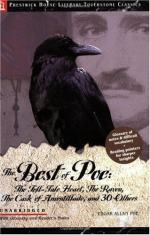|
This section contains 408 words (approx. 2 pages at 300 words per page) |

|
SOURCE: "Edgar Allan Poe: 'Tales of Mystery and Imagination'," in Aspects of the Modern Short Story: English and American, University of London, 1924, pp. 32-44.
In the following excerpt, Ward points out that the lack of motive on the part of the narrator is a major flaw in "The Tell-Tale Heart. "
"The Tell-Tale Heart" is one of the most effective parables ever conceived. Shorn of its fantastic details regarding the murdered man's vulture-like eye, and the longdrawn-out detail concerning the murderer's slow entrance into his victim's room, the story stands as an unforgettable record of the voice of a guilty conscience.
Despite its merit as a parable, "The Tell-Tale Heart" is marred by the insanity of the chief character. From the very first sentence his madness is apparent through his desperate insistence upon his sanity; and the preliminaries of his crime go to prove that madness. The vital weakness...
|
This section contains 408 words (approx. 2 pages at 300 words per page) |

|


